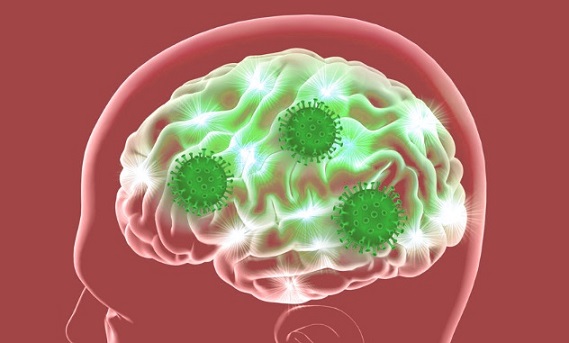New Study Shows That SARS-CoV-2 Infects the Brain via ACE2, CD147, and NRP1 Receptors and Exhibits Neurotoxic Effects
Nikhil Prasad Fact checked by:Thailand Medical News Team Feb 15, 2025 1 month, 3 weeks, 5 days, 5 hours, 43 minutes ago
Medical News: Since the onset of the COVID-19 pandemic, scientists and healthcare professionals have observed a concerning trend: many patients experience neurological symptoms, including memory loss, brain fog, headaches, and even severe conditions like strokes and encephalopathy. A new study has now provided crucial insights into how the SARS-CoV-2 virus infiltrates the human brain and the devastating effects it can have on neural cells.
 News Study Shows That SARS-CoV-2 Infects the Brain via ACE2, CD147, and NRP1 Receptors and
News Study Shows That SARS-CoV-2 Infects the Brain via ACE2, CD147, and NRP1 Receptors and
Exhibits Neurotoxic Effects
Researchers from the University of Milan, Italy, in collaboration with the Neurology Unit at the Foundation IRCCS Ca’ Granda Ospedale Maggiore Policlinico, and other affiliated institutions, have conducted groundbreaking research demonstrating that SARS-CoV-2 directly infects human cortical organoids through three key receptors: ACE2, CD147, and NRP1. The study also reveals that the virus, along with its spike protein, triggers significant neurotoxic effects, possibly contributing to long-COVID symptoms. This
Medical News report delves into the study’s findings and their implications for the future of neurology and post-COVID care.
The Study: A Closer Look at the Research
The research team used human-induced pluripotent stem cells (hiPSC)-derived human cortical organoids (HCOs), a model that closely mimics the structure and function of the human brain. Their goal was to investigate:
-The expression of SARS-CoV-2 entry receptors in brain cells
-Whether SARS-CoV-2 can productively infect human brain cells
-The virus's impact on neural homeostasis and inflammation
-The neurotoxic effects of the SARS-CoV-2 spike protein alone
Their experiments revealed that human cortical organoids express the main receptors necessary for SARS-CoV-2 entry: ACE2, CD147, and NRP1. Further tests confirmed that the virus effectively infects these brain organoids, causing a series of harmful effects that disrupt brain cell function.
How SARS-CoV-2 Gains Entry into Brain Cells
SARS-CoV-2 relies on several receptors to enter human cells, with ACE2 being the most well-known. However, this study emphasizes that the virus also uses CD147 and NRP1 as alternative entry points into brain cells.
-ACE2 (Angiotensin-Converting Enzyme 2): Already known as a key receptor for SARS-CoV-2, ACE2 is found in various tissues, including the brain. This receptor facilitates viral entry by allowing the spike protein to attach to host cells.
-CD147 (Basigin or EMMPRIN): The study found that CD147 is highly expressed in brain cells, making it a crucial receptor for SARS-CoV-2 neuroinvasion.
-NRP1 (Neuropilin-1): This receptor enhances the virus's ability to attach and infect cells, further supporting its neuroinvasive properties.
&nb
sp;
The study’s findings suggest that even if ACE2 expression in the brain is lower than in the lungs, the presence of CD147 and NRP1 may allow SARS-CoV-2 to effectively infiltrate and damage neural tissues.
Neurotoxic Effects of the Virus and Its Spike Protein
Beyond confirming that SARS-CoV-2 infects brain cells, the study highlights the virus’s ability to disrupt cellular function. Researchers found that infection triggers inflammatory responses, apoptotic pathways (cell death mechanisms), and stress-related signals within brain cells. Alarmingly, similar effects were observed when brain cells were exposed to the spike protein alone, even without direct viral infection.
Some of the key changes observed in infected or spike protein-exposed brain organoids include:
-Increased inflammation: Activation of NLRP3 and IL-18 pathways, which are associated with neuroinflammation and potential neurodegenerative diseases
-Activation of stress responses: Elevated expression of S100B, a marker linked to brain injury and neurological disorders
-Apoptotic cell death: Increased expression of BAX, CASP3, and CASP8, which are genes involved in programmed cell death
-Alterations in antigen presentation: Upregulation of molecules involved in immune recognition, potentially contributing to autoimmunity or neuroinflammatory disorders
These results suggest that SARS-CoV-2 and its spike protein could cause long-term damage to the brain, even in patients who recover from the acute phase of COVID-19. This may explain the persistent neurological symptoms observed in individuals with long COVID.
Implications for Long COVID and Future Research
The findings of this study have significant implications for understanding long COVID and its neurological effects. Millions of people worldwide have reported lingering symptoms months after recovering from COVID-19, with brain fog, fatigue, and cognitive impairments being among the most common complaints.
The study raises critical questions about whether SARS-CoV-2 infection or its spike protein exposure alone can contribute to long-term neurodegenerative diseases. It also underscores the urgent need for further research into the virus’s effects on the nervous system and potential treatments for COVID-19-related neurological disorders.
Conclusion
This study represents a major step in uncovering the relationship between SARS-CoV-2 and the human brain. By demonstrating that the virus infects human cortical organoids via ACE2, CD147, and NRP1 receptors, and induces neurotoxic effects even through spike protein exposure alone, the research provides valuable insights into COVID-19’s neurological impact.
These findings emphasize the need for continued research on COVID-19’s long-term effects and potential treatments for individuals experiencing lingering neurological symptoms. Understanding how the virus interacts with brain cells can help develop targeted therapies to mitigate the neurotoxic consequences of SARS-CoV-2.
The study findings were published in the peer-reviewed journal: The FASEB Journal.
https://faseb.onlinelibrary.wiley.com/doi/10.1096/fj.202401604RRR
For the latest
COVID-19 News, keep on logging to Thailand Medical News.
Read Also:
https://www.thailandmedical.news/news/russian-study-reveals-concerning-diffuse-brain-changes-in-acute-and-post-covid-19-phases
https://www.thailandmedical.news/news/indian-researchers-find-that-microrna-30b-5p-and-let-7a-5p-play-a-role-in-covid-19-related-brain-inflammation
https://www.thailandmedical.news/news/romanian-study-warns-that-covid-19-increases-risk-of-brain-bleeding
https://www.thailandmedical.news/articles/coronavirus
https://www.thailandmedical.news/pages/thailand_doctors_listings
https://www.thailandmedical.news/pages/thailand_hospital_listings
Follow us on:
https://x.com/ThailandMedicaX
https://www.facebook.com/ThailandMedicalNews
https://bsky.app/profile/thailandmedical.bsky.social
https://gettr.com/user/thailandmedicalnews
https://www.tribel.com/thailandmedical/wall
and 33 other social media platforms
